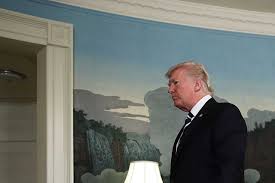by Jean M. Yarbrough,
from City Journal,
10/8/17:
For all his bluster, the president has championed values that built America, as Tocqueville saw it.

Visiting the United States in 1831, when Andrew Jackson was president, Alexis de Tocqueville was appalled by the “vulgarity and mediocrity” of American politics. After meeting Jackson, Tocqueville concluded that the low tone of American society started at the top. In Tocqueville’s estimation, Jackson was “a man of violent character and middling capacity.” Worse, he seemed to have no talent for politics: he rode “roughshod over his personal enemies” in a way no president had done and treated members of Congress with disdain. “Nothing in all the course of his career had ever proved that he had the requisite qualities to govern a free people,” Tocqueville wrote in Democracy in America, “so the majority of the enlightened classes of the Union had always been opposed to him.”
Considering his view of Jackson, imagine what Tocqueville’s first impressions of President Trump might be.
Trump would seem to confirm Tocqueville’s worst fears about debased standards of American public life and leadership. And yet, Trump campaigned on issues that have a Tocquevillean resonance. Put another way, Tocqueville highlighted certain dangers to democratic liberty and greatness that Trump—who, it is safe to assume, has not read Democracy in America—instinctively seized on to win the presidency.
Start with the most obvious—and contentious—issue: Trump’s campaign pledge to build a wall to stop the flow of illegal immigrants from Mexico into the United States. Though Trump’s rhetoric on the subject was often crude, the idea was eminently sensible. Trump spoke to the long-term interest of American citizens in remaining a unified and self-contained people—what Tocqueville called their “self-interest, well understood.”
Tocqueville had been struck by Americans’ love of country; he would not be surprised by the appeal of Trump’s full-throated patriotism, especially when set against his critics’ championing of multiculturalism and globalization. For Tocqueville, national identity was bound up with religion, which, in the United States and in Europe, meant Christianity. Long before the 2016 presidential election, though, Democrats had clearly come to regard Christianity as an obstacle to their goals.
More From City Journal:














